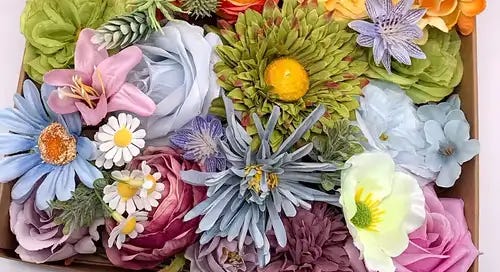Following the Royal Model: On the Occasion of Cutting Imitation Flowers in the Royal Banqueting Hall on the First Day of Spring Zhao Yanzhao Silk flowers greet the coming of the year, Pull down a branch, they still seem genuine. The blooming reds show how our ardour burns, Fresh greens are like our life-force, glistening. The subtle scent and dainty hues confuse Both flower girls and swallows on the wing, They call for the caress of a gentle breeze, To jointly call the fragrant trees to spring. 赵彦昭 奉和圣制立春日侍宴内殿出剪彩花应制 剪彩迎初候,攀条故写真。 花随红意发,叶就绿情新。 嫩色惊衔燕,轻香误采人。 应为熏风拂,能令芳树春。 On the Occasion of Cutting Imitation Flowers in the Royal Banqueting Hall on the First Day of Spring Su Ting At dawn we find the gardens fit for spring, The palace grounds awash with rich perfume. Here scissors cut the pearly silk, And rouge is making flowers bloom. The curious colour shocks the floating snow, A lavish scent dabs the nimble breeze, The flowers put Heaven’s will on show: Let everything unfold like these! 苏颋 立春日侍宴内出剪彩花应制 晓入宜春苑,秾芳吐禁中。 剪刀因裂素,妆粉为开红。 彩异惊流雪,香饶点便风。 裁成识天意,万物与花同。
As the poets heaped praise on the emperor and his imitation flowers, much of what they said was simply flowery language. Song Zhiwen in the previous installment pictured bees and butterflies flapping around, fooled by the silk blooms. Here Zhao Yanzhao suggests that swallows are picking bits of the flowers off for their nests. None of this is true, just a poet’s fancy.
Similarly, I think the disagreement over the fragrance of the flowers reflects the fact that we’re mostly doing panegyric here, rather than trying to accurately describe these manufactured objects. Su Ting claims that the palace looks like spring (in reality, others have pointed out out that the imitation flowers were being kept in wooden chests). And because it’s spring, there must be springtime fragrance, right? So he claims that the scent is lavish.
Zhao Yanzhao, meanwhile, takes the opposite tack: these flowers look so realistic that the swallows and flower girls flock around them - and then are utterly bemused by the fact that they don’t in fact have any aroma. The contradiction exists because this is court poetry: not trying to be a careful exposition of some truth, but a skilful stringing together of poetic tropes.
I particularly like Zhao’s poem here because of the rhyming technique: he chooses the rhyme “-ing” (something like ‘en’ or ‘in’ in Tang Chinese), and then holds off using the word spring. Everyone who heard the ‘-ing’ rhyme in the first line would be waiting for it, until it arrives with a satisfying thump at the end of the last line.



